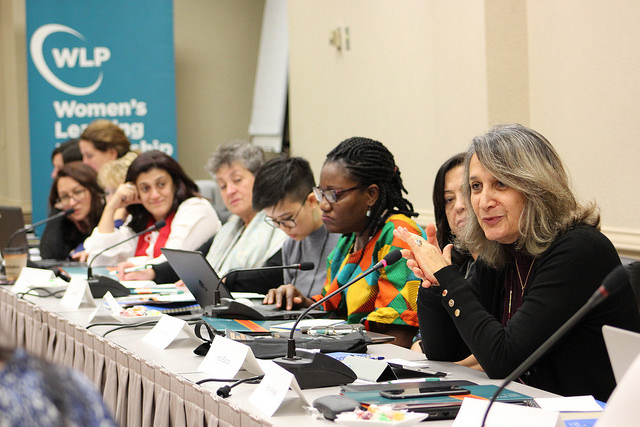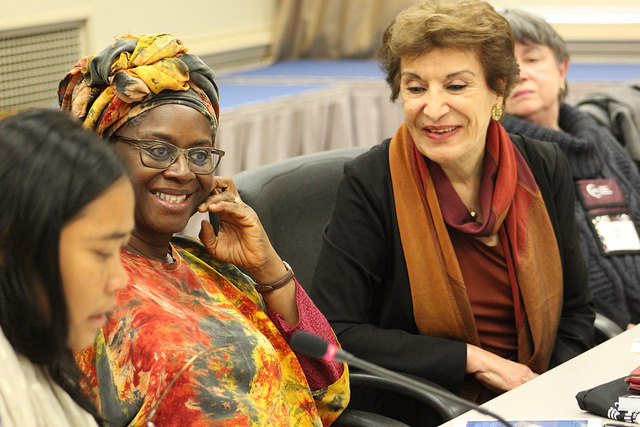
Each year, representatives from WLP meet to reflect on their work, analyze issues facing women’s rights advocates, and plan for the future of the global partnership. This annual event—called the Transnational Partners Convening (TPC)—is an opportunity for the women leaders around the world that make up the Partnership to connect with one another and collaborate on strategies for gender equality. WLP hosted the 2018 TPC in Potomac, Maryland from October 28 through November 1.
The discussions and breakout sessions during the 2018 TPC produced a blueprint for WLP’s work moving into the next year. Despite the many obstacles that partners face, they were optimistic about their potential to create sustainable, positive change, starting with women at the grassroots all the way up to national policy circles. Among the many highlights of the event, here are four takeaways:

1. To solve problems locally, we should look globally.
Local problems require local solutions, but it’s critical to look beyond one’s own borders for insight. With the wealth of different cultural perspectives in the room, TPC participants comprehensively analyzed the current state of global affairs and human rights. They also shared lessons from activism in their countries that could be applied to each other’s work.
“Understanding global trends helps us understand the local challenges we are facing because everything is linked,” said WLP board member Hoda Elsadda during the opening session of the TPC. “So when understanding what is happening in your own country, it is important to lift your head and look around you and see what is happening everywhere else, too.”
2. Inequality in the family affects communities in all parts of the world.
Inequality within the family unit is a global problem that takes different forms in different contexts. In some regions, it manifests in discriminatory laws that affect a woman’s right to divorce, hold a job, or make choices about her body. In other places, inequality in the family leads to harmful practices like child marriage or honor violence. TPC participants discussed the impact of this issue in the dozens of countries in which they work.
WLP partners also used the TPC to formulate next steps for the Partnership’s global campaign on this issue, Equality Starts in the Family. They stressed the importance of building coalitions and using multiple, complimentary approaches, like leveraging the cases studies and strengthening grassroots movements.
“[The Partnership] is making it meaningful to go from research to policy to mobilization,” said WLP President Mahnaz Afkhami. “Research by itself is very interesting and powerful, but it doesn’t do much unless there is the connection…and just in this room, the connections that we are able to make will give us a huge amount of possibility.”

3. Refugee women are leaders, not victims.
WLP partners work to build the capacity of women and girls who have been forced to leave their homes. From Syrian refugee communities in Jordan, Lebanon, and Turkey to internally displaced camps in Nigeria, WLP’s self-empowerment model is used to strengthen women’s leadership skills.
During the TPC, participants discussed the various challenges facing refugee populations as they navigate host communities. They noted the importance of continuing to support refugee women, especially as attention from the international community and financial aid from donors begins to decline.
As some refugee communities look to either return home or secure a future in their host countries, partners examined the critical role host communities play in supporting refugees. Partners identified opportunities to build social cohesion in host countries by bringing together local women and refugee women for leadership and empowerment workshops. These workshops aim to create a safe space for women to share their experiences, find shared goals, and build solidarity across communities.
“Our work with refugee women should focus first on helping women being prepared for this new phase, not as victims but as active citizens in taking care of themselves and their families and the future of their country,” said Asma Khader, CEO of WLP’s partner in Jordan, SIGI-J. “This means that our training manuals, Leading to Action and Leading to Choices, are very much needed to empower women and to build their self-confidence.”

4. Building peace means embracing diversity.
Many WLP partners work in post-conflict countries where communities are working to build peaceful, democratic structures. To do this, they emphasize the importance of incorporating multiple perspectives as part of promoting tolerance and human rights for all.
WLP board member Abena Busia summarized this idea, saying that despite difficulties, “…there is hope, in a very real sense, that for good or ill, we are all living through the attempts to make complex, disparate communities a family. And there is a profound sense that creating a nation is like trying to bring together an unruly family-- it is hard, but it is a worthwhile if you want to live in a just society.”
The diversity of the Partnership is both celebrated and used as a tool to drive meaningful change. Through sharing their local advocacy experiences and common goals for equitable and peaceful societies, WLP partners left the TPC energized and hopeful.
Related Content
WLP supports calls from WLP partner Bir Duino-Kyrgyzstan to revise new restrictive NGO law
WLP strongly support our partner in Kyrgyzstan - Human Rights Movement: Bir Duino - in condemning the recently drafted law on “non-commercial non-governmental organizations” in Kyrgyzstan.
The WLP Partnership Is Empowering Vulnerable Populations During the Coronavirus Crisis
Around the world, the spread of COVID-19 is changing how civil society organizations (CSOs) are able to conduct their work and the global women’s movement in particular is facing extraordinary challenges. Organizations that amplify women’s voices and choices on issues ranging from personal status laws to reproductive health are now confronting unparalleled hurdles but are also finding innovative approaches to continue their work. Women’s Learning Partnership’s has mobilized to ensure that the needs of women are not overlooked in emergency responses to the pandemic. Our partners are adapting their programs and campaigns to address the evolving challenges by moving their events online, using messaging apps and social media to disseminate information, sensitizing journalists about the pandemic’s particular threats to women in the home and outside, raising funds for populations most at-risk, and even broadcasting messages by megaphone in communities where there is limited technology infrastructure and access to the web.